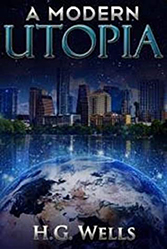 Author: H.G. Wells / Year: 1866 - 1946 / Genre: Sci-Fi
Author: H.G. Wells / Year: 1866 - 1946 / Genre: Sci-Fi In this 1905 philosophical essay/science-fiction novel hybrid, H. G. Wells carefully outlines and vividly describes how his “Modern Utopia” would look and function through the voice of an unnamed fictional narrator who, along with his companion, the botanist, imagines himself transported to a parallel utopian version of planet Earth. During the course of the novel, the voice of the narrator slowly pieces together the various elements of his imagined utopian society, from the economic system to race relations and marital law. From current perspective, the author’s World Government seems quite authoritarian and frightful in nature: having full control of the planet’s natural resources, a complex and expansive bureaucratic system, being the sole arbiter of what’s moral and good, etc. Though we are assured that the State is entirely benevolent and utilitarian, providing the maximum possible amount of freedom (one’s freedom ends where another one’s begins), while minimising suffering and security risks, it’s easy to be cynical and dismiss those notions as a pipe dream of a raving lunatic. But let us, for the purposes of this analysis, entertain the idea that such a governing body can exist; so how does it balance freedom with security?